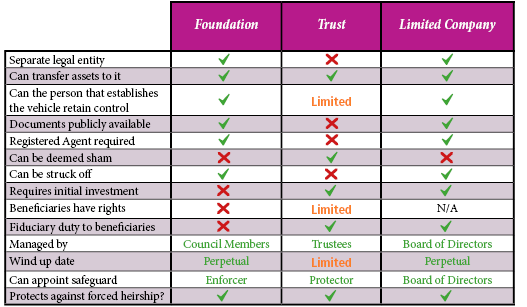Background
Malta has long been an established choice for fund managers seeking to set-up in a reputable EU jurisdiction whilst being cost-effective.
What Type of Funds Does Malta Offer?
Since Malta became an EU member in 2004, it has incorporated a number of EU fund regimes, most notably; the ‘Alternative Investment Fund (AIF)’, the ‘Undertakings for the Collective Investment in Transferable Securities (UCITS)’ regime, and the ‘Professional Investor Fund (PIF)’.
In 2016 Malta also introduced a ‘Notified Alternative Investment Fund (NAIF)’, within ten business days of completed notification documentation being filed, the Malta Financial Services Authority (MFSA), will include the NAIF on its online list of notified AIFs of good standing. Such a fund remains fully EU compliant and also benefits from EU passporting rights.
EU Collective Investment Schemes
A series of European Union Directives allow collective investment schemes to operate freely throughout the EU, on the basis of a single authorisation from one member state.
Characteristics of these EU regulated funds include:
- A framework for cross-border mergers between all types of EU regulated funds, allowed and recognised by each member state.
- Cross-border master-feeder structures.
- Management company passport, which allows an EU regulated fund established in one EU member state to be managed by a management company in another member state.
Dixcart Malta Fund Licence
The Dixcart office in Malta holds a fund licence and can therefore provide a comprehensive range of services including; fund administration, accounting and shareholder reporting, corporate secretarial services, shareholder services and valuations.
The Benefits of Establishing a Fund in Malta
A key benefit of using Malta as a jurisdiction for the establishment of a fund is the cost savings. The fees for establishing a fund in Malta and for fund administration services are considerably lower than in many other jurisdictions.
The advantages offered by Malta include:
- An EU Member State since 2004
- A highly reputable financial services centre, Malta was placed among the top three financial centres in the Global Financial Centres Index
- Single regulator for Banking, Securities and Insurance – highly accessible and robust
- Regulated quality global service providers in all areas
- Qualified professionals
- Lower operational costs than other European jurisdictions
- Quick and simple set-up processes
- Flexible investment structures (SICAV’s, trusts, partnerships etc.)
- Multilingual and professional work-force – an English-speaking country with professionals usually speaking four languages
- Fund listing on the Malta Stock Exchange
- Possibility of creation of umbrella funds
- Re-domiciliation regulations are in place
- Possibility of using foreign fund managers and custodians
- The most competitive tax structure within the EU, yet fully OECD compliant
- An excellent network of double taxation agreements
- Part of the Eurozone
What are the Tax Advantages of Establishing a Fund in Malta?
Malta has a favourable tax regime and a comprehensive Double Tax Treaty network. English is the official business language, and all laws and regulations are published in English.
Funds in Malta enjoy a number of specific tax advantages, including:
- No stamp duty on the issue or transfer of shares.
- No tax on the net asset value of the scheme.
- No withholding tax on dividends paid to non-residents.
- No taxation on capital gains on the sale of shares or units by non-residents.
- No taxation on capital gains on the sale of shares or units by residents provided such shares/units are listed on the Malta Stock Exchange.
- Non prescribed funds enjoy an important exemption, which applies to the income and gains of the fund.
Summary
Maltese funds are popular due to their flexibility and the tax efficient features that they offer. Typical UCITS funds include equity funds, bond funds, money market funds and absolute return funds.
Additional Information
If you require any further information regarding establishing a fund in Malta, please speak to your usual Dixcart contact or to Jonathan Vassallo at the Dixcart office in Malta: advice.malta@dixcart.com





